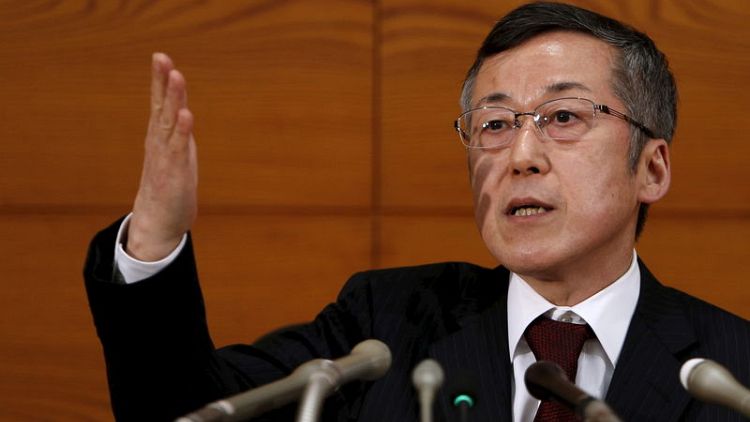By Tetsushi Kajimoto
TOKYO (Reuters) - Bank of Japan board member Yutaka Harada said on Thursday the central bank should continue its current monetary stimulus in order for prices and interest rates to eventually pick up, though he refrained from calling for further easing.
"Given that current low interest rates were caused by deflationary monetary policy in the past, the only way is to wait for prices and interest rates to rise while continuing current monetary easing aimed at sustaining economic growth," Harada said in a speech to business leaders in Oita, southern Japan.
Years of the BOJ's heavy money printing have failed to fire up inflation and crushed long-term interest rates near zero, drawing criticism from financial institutions for narrowing their margins and hurting their profits.
Harada, a vocal advocate of aggressive monetary easing, countered that criticism, contending that bank management woes are "structural problems" caused by higher savings and weaker demand for loans.
He urged banks to address this problem, saying that raising interest rates is not a solution.
"If interest rates are raised, that could lower lending demand, cause prices to fall and the yen to rise, and trigger a recession and bankruptcies which will cause banks' credit costs to shoot up," he said.
Banks should be able grow earnings by downsizing and converting to profitable business, Harada added.
Under a policy dubbed yield curve control, the BOJ aims to guide short-term rates at minus 0.1% and the 10-year government bond yield around 0%.
It kept policy steady at its last rate review in October but tweaked its forward guidance to say it would maintain ultra-low rates or even cut them for as long as needed to gauge overseas risks.
The BOJ's nine-member board is divided between those like Harada who see room to ramp up stimulus, and those who are more worried about the rising cost of prolonged easing.
BOJ Governor Haruhiko Kuroda on Friday said he saw no need to expand monetary stimulus now, underscoring the central bank's preference to save its dwindling ammunition in case the economy takes a bigger hit from overseas risks.
Harada made no mention of further easing during the speech, but he hailed positive effects of monetary stimulus, including stimulating investment, boosting share prices and weakening the Japanese currency.
"Bold monetary easing has stimulated the economy, boosted tax revenue and improved Japan's fiscal conditions."
(Reporting by Tetsushi Kajimoto; Editing by Chang-Ran Kim & Shri Navaratnam)



